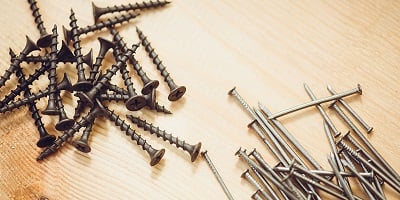
Do you ever find yourself wondering which is the better option, nails or screws? You're not alone. The truth is that one might be better than the other depending on the application or construction project. It's important to know when nails or screws are the right option. Knowing how to weigh the pros and cons of both, depending on your needs, will ensure that you choose the best fastener for the job.
Project Size and Type
Many times, the size and type of construction or carpentry project will help to determine if you should use screws or nails. Nails are cheaper and stronger fasteners in certain applications such as house framing, roofing, or installation of hardwood flooring. On the other hand, with their great tensile strength, screws tend to be the ideal solution for projects like decking or hanging heavy objects, such as shelving, on walls. You generally have more control with screws compared to nails. Traditionally, nails have been a popular choice for large fastening jobs due to efficiency – they are quickly installed with a hammer or nail gun – and lower cost. But, with today’s power tools, both nails and screws can be used efficiently.
Flexibility and Strength
You'll want to opt for nails when it comes to structural joining for frame walls. Nails tend to have more flexibility under pressure, while screws can snap more easily in these situations. However, it's essential to choose the right type of nail for the job. Box nails are narrower and cause less splitting of wood when they are put in, making them a better choice for projects like installing wood siding. When securing door jambs, baseboards or other detail work, brads and finish nails are a better choice.
While nails are more flexible, screws have better tensile strength. That means that screws are less likely to break under pressure, in general. That's why they're the ideal choice for many situations, particularly where weight is involved like kitchen cabinetry. Screws also have less tendency to allow surfaces to pull apart.
Outdoor Applications
Contractors frequently choose screws for many applications outdoors like decks because they have reduced likelihood to rust. Nails are much more prone to rusting. With screws, their head may eventually show signs of rusting, but the shaft will stay intact.
Removal
If you're working on a project that will require the removal of fasteners, screws are definitely the right option. Screws can be mechanically installed and removed. Nails aren’t easily removed. Moreover, screws can be reused after their removal unlike nails.
The Combined Nail Screw
Now, you can get the best features of both nails and screws with SCRAIL® Fasteners by BECK. SCRAIL® Fasteners are designed with efficacy and efficiency in mind. They are quickly driven like nails and easily removed like screws and come in both coarse and fine threads. When you rely on SCRAIL® Fasteners, you're a winner every time. SCRAIL®. The Faster Fastener®.
.svg.png)

